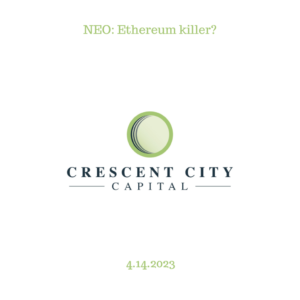NEO: Ethereum killer?
By Rayna Ishihara | Crescent City Capital Market Analyst Intern
What is NEO
NEO is a blockchain-based platform that is open-source and decentralized, allowing anyone to create their own blockchain services and products. The platform is known for its fast transaction processing times, making it an attractive option for developers.
NEO was founded by Da Hongfei and Erik Zhang in 2014 under the name Antshares, then rebranded to NEO in June 2017. It is often compared to Ethereum because it provides similar tools and capabilities for building decentralized applications, such as decentralized exchanges and price markets. As a result, NEO is sometimes referred to as “the Ethereum of China”.
Through the use of smart contracts, NEO provides developers with the ability to digitize and automate the management of assets. A smart contract is an automated program that executes the actions required in a contract, with transactions that are trackable and irreversible. This allows for trusted agreements and transactions to be carried out without the need for a central authority or legal system. The ultimate objective of NEO is to construct a smart economy system that is network-based and distributed, powered by decentralized applications.
Smart Economy
NEO’s smart economy is based on three foundational pillars: digital assets, digital identity and smart contracts.
Digital assets: NEO enables developers to manage assets digitally and automatically, without intermediaries and at no cost. The platform is open, decentralized, and transparent, allowing users to record, buy, sell, or exchange any asset type. It also supports the linking of digital assets to unique avatars and provides protection through valid digital identities, which are recognized by the law.
Digital identity: By enabling digital identity, the Neo blockchain allows for the verification of key information about individuals or organizations participating on the platform, thus ensuring adherence to regulatory requirements.
Smart Contract: Smart contracts are utilized by NEO to execute transactions and agreements without any central governance by a legal entity. The code allows for traceability, transparency, and irreversibility of transactions. This enables different parties to engage in transactions and agreements on the platform.
NEO Tech
NEO uses a consensus mechanism called delegated Byzantine Fault Tolerant (dBFT) to secure its blockchain and keep its network in sync. dBFT works by using a real-time voting system to determine which computers can create the next block on the chain. Each NEO token can be staked to represent a vote, with the consensus nodes responsible for adding new blocks and receiving transaction fees in GAS cryptocurrency.
The NEO virtual machine supports several programming languages, including C#, Java, C, C++, GO, JavaScript, Python, and Ruby.
NEO Token
Neo has a dual-token system separating governance rights from network usage rights, NEO and GAS. The NEO token is used for governance, where holders participate by voting for the Neo Committee, while GAS is used for the operation and storage of tokens and smart contracts. NEO has a total of 100 million tokens, with approximately 50% reserved by the Neo Foundation for ecosystem development. GAS tokens are generated every block and distributed to voters as a reward for playing an active role in network governance. NEO holders do not need to stake their tokens to claim GAS since most Neo wallets have a claim function for GAS.
Recent updates
The live NEO price on April 13th is $12.37 USD with a 24-hour trading volume of $33,550,910 USD. It has a circulating supply of 70,538,831 NEO tokens.
Summary
NEO is a decentralized, open-source blockchain platform that allows developers to create blockchain services and products. It offers fast transaction processing times and tools similar to Ethereum for building decentralized applications. NEO’s smart economy is based on digital assets, digital identity, and smart contracts, enabling trust in transactions and agreements without the need for a central authority. The platform uses delegated Byzantine Fault Tolerant (dBFT) consensus mechanism and supports several programming languages. Neo was a pioneer in the early blockchain industry not only was it the first public smart contract platform to be founded in China, it was also the first chain to use a dual token model and the first to implement a BFT style consensus mechanism.

